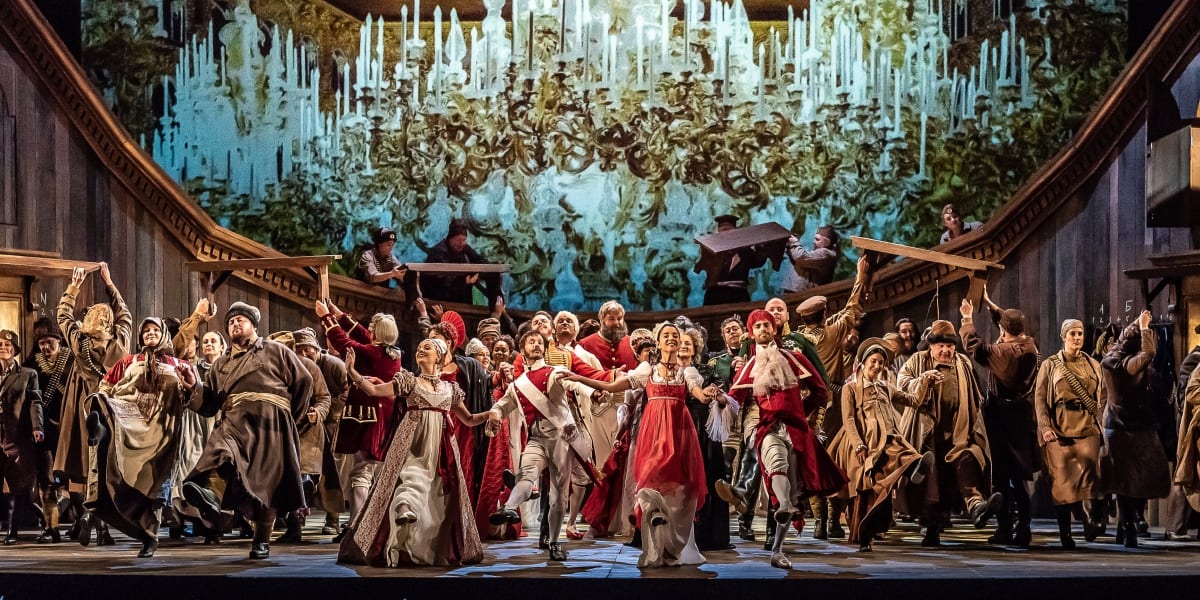Celebrated as one of the greatest contributions to the literary canon, Prokofiev’s lauded adaptation of Tolstoy’s 1869 novel War and Peace, makes its way to the ROH for only two evenings. In this new production by the Welsh National Opera, director Sir David Pountney is influenced by the critical research of musicologist Rita McAllister. Staying true to the composer’s original intentions, the production explores both initial and belated additions. Written in only two years, and notably against the backdrop of German-Soviet conflict, Prokofiev’s writing draws upon his own experience and the narrative of Tolstoy’s text. Driven by the tumult of romance, family, class and prejudice, Prokofiev’s work colours a narrative tainted by the consequences of war.
The opera’s opening scene is stirring. The WNO’s chorus is steadfast, charged, and packed with emotional heft. Marie-Jeanne Lecca’s periodic costumes serve as nuanced proleptic insights of what’s to come. Under the baton of Tomas Hanus, Prokofiev’s rousing orchestral writing is almost tangible by the WNO orchestra — brass fanfares are militant, timpani rolls sinister, and harp glissandi vehement. Dynamic contrasts excellently depict the extremities of war — each note viscerally punctuates the scene.
Robert Innes Hopkins’ set design — a relatively simple wooden-panelled arc, is made most effective by David Haneke’s cinematic projections. Each frame is unique in its reel. From Hades-esque scenes of destruction to the quasi Jane-Eyre sitting-room.
Delicate though compelling, soprano Lauren Michelle executes the role of Natasha with mastery. Commendable in diction — N.B this production is set in English rather than the original Russian, Michelle maintains a clear and beautiful lyricism to her voice, even at moments of evident turmoil. Natasha’s love interest, Prince Andrei is portrayed in a commendable performance by Jonathan McGovern. Princely powerful, McGovern’s voice is versatile in its tender and decisive timbre. The most noteworthy performance of the evening, however, must be credited to Mark Le Brocq’s Pierre. True in disposition, and unwavering from his moral compass, Le Brocq embodies the very nature of the role. Projection and acting are strong, unlike Tolstoy’s slightly meeker Pierre, and Le Brocq’s acting is wedded beautifully beside Michelle’s.
James Platt as Count Rostov is sincere, despite the naivety and meek disposition the role entails, Platt’s vocals are executed with prowess. Johnathan May’s Old Prince Bolkonsky is formidable — whilst depicting an aged man, May’s portrayal seeped gravitas. Samantha Price as Sonya was equally as striking, from trusted comrade to scheming deceiver, Price’s timbre was suited to the role’s demands.
As in the monumental text, Prokofiev’s opera is of similar depth, with the work lasting around three-and-a-half hours. Dispersed intermittently — possibly for temporary relief, were scenes of mazurka, waltz and ballet. The playfulness of the dancers bearing muskets, whilst seamless, was tinged by the inescapable pathos the opera exudes.

